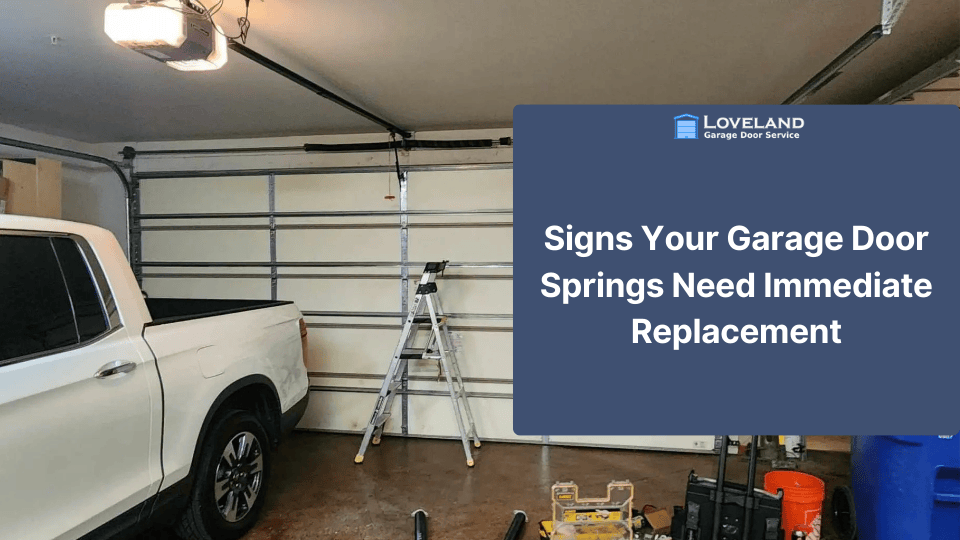The springs in your garage door system are the unsung heroes of daily convenience. They bear the enormous weight of the door—often several hundred pounds—converting tension into energy that allows the motor (or you) to lift and lower it with ease. However, garage door springs, whether they are torsion (mounted above the door) or extension (mounted along the sides of the track), have a finite lifespan. Ignoring the signs your garage door springs need immediate replacement is not just an inconvenience; it can be a serious safety hazard and lead to catastrophic damage to your opener system.
Recognizing the early warning signals is crucial for home safety and avoiding costly, complex repairs. This guide will walk you through the most critical indicators that your springs are failing and require professional attention right away. The primary keyword for this article is signs your garage door springs need immediate replacement.
The Catastrophic Indicator: A Loud, Explosive Sound
The most dramatic and undeniable sign your garage door springs need immediate replacement is the sound of one breaking.
- The Noise: A torsion spring breaking releases its coiled tension instantaneously, resulting in a sound often described as a loud bang, a gunshot, or an explosion. The noise is sudden, shocking, and unmistakable.
- What to Do: If you hear this sound, do not attempt to open or close the door. The spring is broken, and the door is now incredibly heavy and unstable. If the door is stuck open, it poses a risk of slamming shut. If it’s closed, the weight will overwhelm the opener motor if you try to activate it.
Visual Confirmation of a Broken Torsion Spring
If you’ve heard the sound, look up at the metal rod directly above the door. A healthy torsion spring will be a tightly wound coil. A broken spring will have a noticeable, several-inch gap in the coil—usually near the center. This visual confirmation is a clear sign your garage door springs need immediate replacement.
Performance Issues: The Door’s Struggle to Function
If you haven’t heard the “bang,” the next set of signs your garage door springs need immediate replacement are noticeable performance problems. These indicate that the springs are either fatigued, losing tension, or are severely damaged.
- The Door Opens Slowly and Jerkily: When a spring begins to lose tension, the opener motor has to compensate for the increasing weight. The door will move slower than normal, often making a straining noise, and may appear to shudder or move unevenly on its tracks. Over time, this stress will burn out your motor.
- The Door Falls Quickly When Closing: If you notice your door dropping rapidly or “slamming” shut instead of descending smoothly, it means the springs are not providing enough counterbalance. This is a hazardous situation, especially if children or pets are nearby.
- The Door Stops Halfway: A severely weakened spring may allow the door to open a few feet before the motor can no longer overcome the imbalance, causing the door to stop and possibly reverse. This is often the point where homeowners incorrectly assume the problem is the opener itself, when the real culprit is the spring.
The Balance Test: A Critical Check
To confirm if your springs are functioning correctly (and not just your opener), perform the balance test:
- Close the garage door completely.
- Remove the red emergency release cord from the door opener.
- Lift the door manually until it is halfway open (around 4 feet).
- Release the door.
The Result: A properly tensioned door should remain stationary at the halfway point. If the door immediately starts to fall down or shoots up, it’s a definite sign your garage door springs need immediate replacement. Caution: If the door is unbalanced, be prepared to catch its weight.
Visible Wear and Tear on Components
Sometimes the warning signs are right in front of you, without needing to open or close the door.
- Gaps in the Torsion Spring: As mentioned earlier, a break in the spring coil is the most obvious visual cue.
- Worn Pulleys or Cables (Extension Springs): If you have extension springs (which run parallel to the horizontal tracks), check the cables and pulleys. Frayed, broken, or slack cables indicate that the system is under duress, usually from an underlying spring issue, and the springs may soon fail.
- Rust and Corrosion: Springs that are heavily rusted will be significantly weaker and more prone to snapping. Rust introduces friction and accelerates material fatigue. Regular maintenance and a light coating of lubricant can prevent this, but heavy rust is a strong indication that the spring’s structural integrity is compromised.
Conclusion
Garage door springs are high-tension components designed to lift hundreds of pounds. Once you observe the signs your garage door springs need immediate replacement—a loud noise, slow or jerky operation, a failure to pass the balance test, or visible gaps—it is imperative to stop using the door immediately. Do not attempt to replace these springs yourself. Spring replacement requires specialized tools and expertise to handle the immense tension safely. Contacting a qualified professional is the only safe and reliable way to ensure your door system is restored to proper working order, protecting your family, your vehicle, and your investment in the garage door opener.
Heard the 'Bang' or Facing a Sagging Door?
Don’t risk injury or further damage to your opener. If you’ve noticed any signs your garage door springs need immediate replacement, call the experts. Contact us today for safe, fast, and professional garage door spring repair service!

